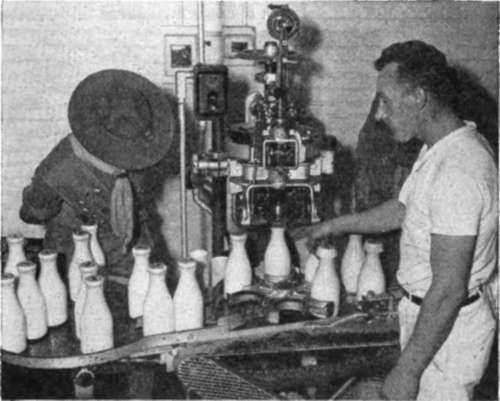Chapter XXXI. Rural Explorer Scouting
Description
This section is from the book "Scouting For Rural Boys. A Manual For Leaders", by Boy scouts of America. See also: Outdoor Adventure Manual: Essential Scouting Skills for the Great Outdoors.
Chapter XXXI. Rural Explorer Scouting
Because of the closeness of the farm home to the farming industry, the "explorations" of older rural Scouts naturally include items related to the whole range of farm life.
Whether the Explorer Scout be a member of an Explorer Troop, Neighborhood Patrol or a Lone Explorer, the explorations planned enable him to "explore" specialized farming enterprises in grain or cotton farming, or with more diversified farming involving live stock, fruit, poultry, dairying, gardening, etc., as well as other life work and hobby interests.
Each of the different ways of getting the projects in Explorer Scouting opens to the young men opportunities to meet, know and counsel with the most worthwhile men of the neighborhood. This contact with some of the "best" men is a great experience and one of great value to young men.
Explorer Scouting brings the young farm "Explorer" into contact with other fine young men of his neighborhood and county, district or council area, thus furthering fine fellowship of lasting value.
The Explorer and Explorer Leader will find detailed program suggestions in the Senior Book-"Adventuring for Senior Scouts"-where organization and program outlines are available in various chapters.
Some Attractive Explorations
1. Various hobbies, skills, collections, readings, etc. Farm craft hobbies include the practical uses for rope, pulleys, halters, leather, cement, tin, copper, wire, as well as the use of farm tools, tractors, trucks, motors, gas engines, electricity. In addition, stone and brick masonry, wood work, painting, plumbing, sanitation, call for attention.
2. Various home and farm explorations-such as practical soil tests; milk tests and records of the dairy herd; trap-nesting and battery records of the poultry flock; checking on too high or too low water table in various fields; studying how to control insect pests in gardens, orchard and wood lot; bookkeeping on crops raised, amount consumed, amount sold; profits, losses and cost of distribution.
3. Exploring geological resources or any relics of ancient peoples on "the place" or nearby.
4. Getting acquainted with the finest men and women of the neighborhood which Rural Scouting furthers. The Merit Badge Counselors, County Agents, Agricultural Teachers and experts are glad to cooperate and be of real help to young men.
5. Having opportunities for social life with young people and with young ladies on the high level for which Scouting and the best homes stand.
6. Exploring the trails to possible life's work in order to answer those vital questions: What line of work shall I follow? How may I get started in that line? What training must I get? These projects are exploratory, not an effort to give vocational training, which is now given to rural youth by vocational schools and their teachers, by county agents, agricultural advisors and vocational leaders.
7. Exploring various Merit Badge subjects and advising with the counselors in these subjects and with the Advancement Committee and Ct. of Honor Staff.

SCOUTS WATCH FINISH OF BOTTLING PROCESS.
8. Exploring the chances for conservation on or near the farm, often helping various state and federal departments combat insect enemies of crops, plants, trees or farm animals. Reforestation projects, putting poor land to work, are excellent rural Explorer jobs, and State Forestry Departments sometimes can help in getting the trees for tree planting work.
9. Exploring for, locating and marking early historic spots and shrines, such as the first settlement, the first church and the first school, first county seat, first grange, first farm bureau, first County Agent, earliest 4-H Clubs and leaders, first Agricultural or Home Economics Clubs, first Cooperatives. Interesting research exploring where first agricultural inventions and implements were made and used. 10. Educational explorations to county seat and court house, with its "mysteries" of taxation, roads, courts, records, commissioners, board of education, public libraries and museums; locate and study factories; charitable and corrective institutions-all of these should prove interesting and broadly educational.
Special Explorer Expeditions
The Senior book "Adventuring for Senior Scouts" contains details for canoe trips, pack saddle expeditions, motor tours, back packing into the wilderness, going on skis or snow shoes, in the desert or in the rain. This same volume outlines "places to go" in every state, the national and state forests, the national and state parks and memorials, the federal and state and county recreation centers, the Pacific Crest Trail and the Appalachian Trail, each with over 2,000 miles of mountain crests and wilderness. These invite the rural Explorer, when his time permits to go on a vacation into them.
Continue to:


